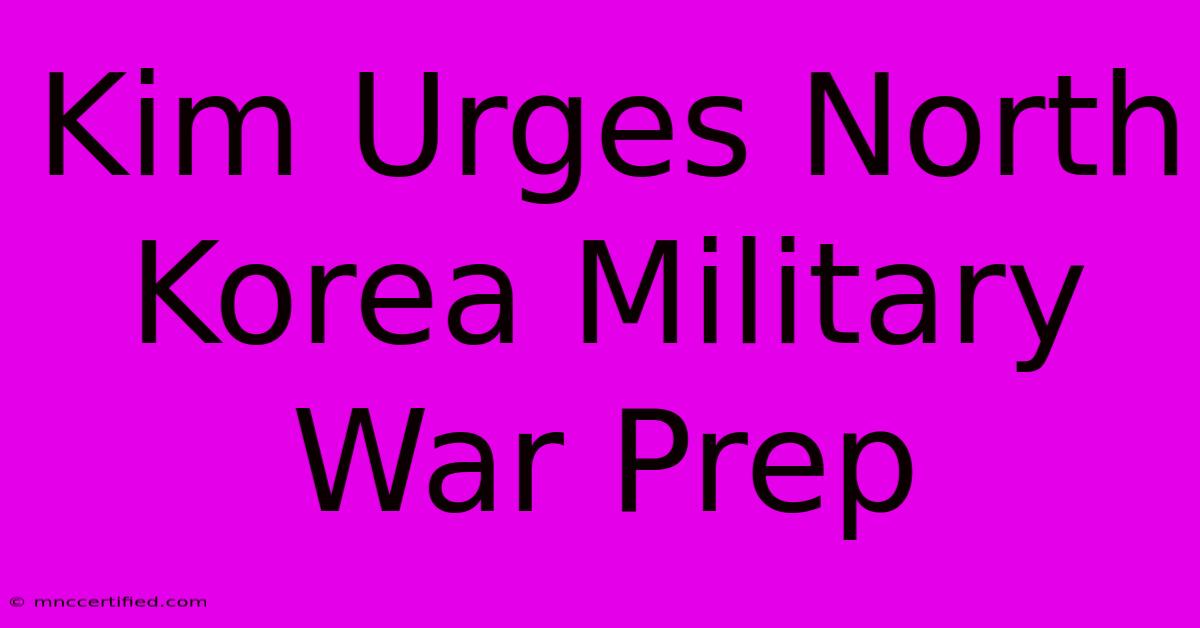Kim Urges North Korea Military War Prep

Table of Contents
Kim Urges North Korea Military War Prep: Heightened Tensions on the Korean Peninsula
Recent statements from North Korean leader Kim Jong Un have sent shockwaves across the globe, with his urgent call for the military to prepare for war dominating international headlines. This heightened state of military readiness raises significant concerns about the stability of the Korean Peninsula and the potential for wider conflict. This article delves into the specifics of Kim's pronouncements, analyzes the underlying reasons for this escalation, and explores the potential implications for regional and global security.
Kim Jong Un's Bellicose Rhetoric: A Deeper Dive
Kim Jong Un's recent address, delivered during a high-level military meeting, emphasized the need for enhanced combat readiness and the strengthening of North Korea's military capabilities. While the exact wording varies depending on the news source, the core message remains consistent: North Korea is preparing for war. His statements included calls for intensified training exercises, improved weapons systems, and a heightened state of alert. This rhetoric represents a significant escalation in North Korea's typically aggressive posturing.
Specifics of the Military Preparations
Reports suggest the preparations encompass a range of activities, including:
- Large-scale military drills: These exercises simulate various combat scenarios, likely including potential conflicts with South Korea and the United States.
- Weapon system upgrades: Focus is likely on improving existing weaponry and potentially testing new ballistic missiles and other advanced military technology.
- Increased border security: Reinforcements and heightened surveillance along the Demilitarized Zone (DMZ) are likely to be implemented.
- Cyber warfare preparedness: North Korea's sophisticated cyber capabilities are likely being further developed and deployed to support military objectives.
Underlying Reasons for the Escalation: Analyzing the Context
Several factors contribute to this heightened military posture from North Korea:
- International Sanctions: Ongoing international sanctions aimed at curbing North Korea's nuclear and ballistic missile programs continue to put significant strain on the country's economy. This economic pressure may be fueling Kim's aggressive stance.
- US-South Korea Military Exercises: Joint military exercises between the United States and South Korea are often cited by North Korea as a provocation, contributing to the escalation of tensions.
- Domestic Politics: Kim Jong Un may be using the threat of war to consolidate power and rally support amongst the North Korean populace.
- Regional Geopolitics: Shifting alliances and power dynamics within the region, particularly concerning China and Russia, may also play a role in shaping North Korea's strategy.
Potential Implications and Global Response
The implications of this heightened military posture are significant and multifaceted:
- Increased risk of conflict: The possibility of accidental escalation or miscalculation leading to armed conflict is a serious concern.
- Regional instability: The situation destabilizes the Korean Peninsula and could potentially spill over into neighboring countries.
- Global repercussions: A major conflict on the Korean Peninsula would have far-reaching consequences, potentially impacting global markets and international relations.
The international community is responding with a mix of diplomacy and deterrence. Discussions between key players like the US, China, South Korea, and others are crucial in managing the situation and preventing escalation. However, the ongoing communication challenges with North Korea remain a significant obstacle.
Conclusion: A Tense Standoff
Kim Jong Un's call for North Korea military war prep represents a dangerous escalation in regional tensions. Understanding the complex interplay of political, economic, and military factors is crucial for navigating this challenging situation. International collaboration and effective communication are essential to de-escalate tensions and prevent a potential catastrophe. The situation remains fluid, requiring continuous monitoring and informed analysis from global leaders and experts. The coming weeks and months will be critical in determining the future trajectory of the Korean Peninsula.

Thank you for visiting our website wich cover about Kim Urges North Korea Military War Prep. We hope the information provided has been useful to you. Feel free to contact us if you have any questions or need further assistance. See you next time and dont miss to bookmark.
Featured Posts
-
Spain Wins 2 1 Against Denmark
Nov 19, 2024
-
Seahawks Game Food Drive November 24
Nov 19, 2024
-
Analyzing Dune Prophecy Episode 1 Easter Eggs
Nov 19, 2024
-
Live Stream Croatia Vs Portugal Uefa Match
Nov 19, 2024
-
Australia Beats Pakistan 3rd T20 I
Nov 19, 2024